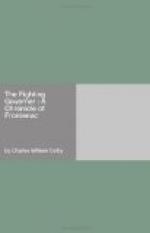Thus Frontenac returned to Quebec in the autumn of 1689, just after the Iroquois massacred the people of Lachine and just before they descended upon those of La Chesnaye. The universal mood was one of terror and despair. If ever Canada needed a Moses this was the hour.
It will be seen from the dates that Denonville’s recall was not due to the Lachine massacre and the other raids of the Iroquois in 1689, for these only occurred after Frontenac had been appointed. Denonville’s dismissal was justified by the general results of his administration down to the close of 1688. Before Frontenac left France a plan of campaign had been agreed upon which it was now his duty to execute. The outlines of this plan were suggested by Callieres, the governor of Montreal, [Footnote: Louis Hector de Callieres-Bonnevue was a captain of the French army who became governor of Montreal in 1684, and succeeded Frontenac as governor of Canada in 1698. He received the Cross of St Louis for distinguished service against the Iroquois. Frontenac could not have had a better lieutenant.] who had been sent home by Denonville to expound the needs of the colony in person and to ask for fresh aid. The idea was to wage vigorous offensive warfare against the English from Albany to New York. Success would depend upon swiftness and audacity, both of which Frontenac possessed in full measure, despite his years. Two French warships were to be sent direct to New York in the autumn of 1689, while a raiding party from Canada should set out for the Hudson as soon as Frontenac could organize it.
In its original form this plan of campaign was never carried out, for on account of head winds Frontenac reached Quebec too late in the autumn. However, the central idea remained in full view and suggested the three war-parties which were sent out during the winter of 1690 to attack the English colonies.
Louis XIV had given Denonville important reinforcements, and with war clouds gathering in Europe he was unwilling or unable to detach more troops for the defence of Canada. Hence, in warring against the Iroquois and the English Frontenac had no greater resources than those at the disposal of Denonville when he attacked the Senecas. In fact, since 1687 there had been some wastage in the number of the regulars from disease. The result was that Frontenac could not hope for any solid success unless he received support from the Canadian militia.
In this crisis the habitants and their seigneurs accepted with courage the duties laid upon them. In the narrower sense they were fighting for their homes, but the spirit which they displayed under Frontenac’s leadership is not merely that which one associates with a war of defence. The French soldier, in all ages, loved to strike the quick, sharp blow, and it was now necessary for the salvation of Canada that it should be struck. The Iroquois had come to believe that Onontio was losing his power. The English colonies were far more populous than New France. In short, the only hope lay in a swift, spectacular campaign which would disorganize the English and regain the respect of the Iroquois.




